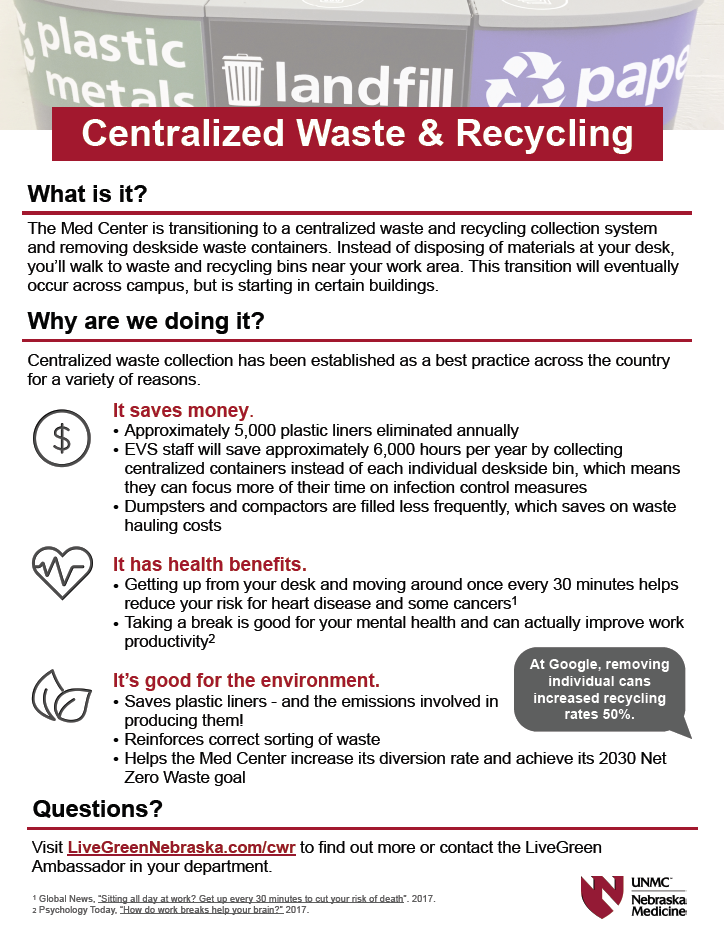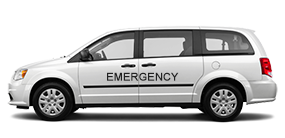Centralized Waste & Recycling
Changes are taking place regarding waste and recycling collection. The normal deskside trash and blue paper bins will be removed from offices in some buildings, and other buildings will follow. Occupants will be notified as the change takes place in their building. Centralized waste and recycling stations will be added to common use spaces and high traffic areas, and individuals will be responsible for sorting their own waste and recycling into those bins.
Wondering why this is happening? There are three very good reasons: centralized waste and recycling saves money, provides health benefits, and is good for the environment.
Financial Benefits
The first stage of centralized waste and recycling will allow the Med Center to stop buying around 5,000 plastic bags per year. Another cost-saving measure will be in the form of employee time as going into each office to collect trash takes thousands of hours a year. Being responsible for our own waste allows EVS staff to focus on infection control measures.
Health Benefits
Being able to stand up and walk around will help you take eye breaks from computer screens and break up your workday. Scientists from Columbia University found that “adults who sit for one or two hours at a time without moving have a higher risk of early death than their peers who are sitting for just as long but are still getting up for even short bouts of movement”. Scientists have also found that short breaks can prevent mental fatigue, restore motivation, and actually boost work productivity. With the centralized stations, you’ll be more likely to get up, creating natural breaks that are great for your physical and mental health.
Environmental Benefits
Many deskside bins require trash liners that must be replaced daily if they contain trash, regardless of volume. It’s a necessary practice, but very wasteful while placing large amounts of plastic in the landfill. Centralized stations also increase recycling rates, and can help to meet our Net Zero Waste by 2030 goal. According to Great Forest Sustainability Solutions, when a centralized waste and recycling system was implemented in a commercial building in NYC, the amount of recycling that ended up in the trash went from 30% down to 7%.
This may seem like a significant transition, but ultimately it will be an easy shift that will reduce waste, increase recycling, boost your work productivity, and help improve your health.
What You Can Do
- Tell your peers about the positive impacts centralized waste and recycling will have on our campus.
- Do not relocate bins. Waste and recycling bins will be intentionally placed, as allowed by code, in specific areas next to each other. If individuals believe more bins are needed, or bins are needed in different areas, please contact evs@nebraskamed.com.
- Do not purchase trash bins or other deskside containers. This is a waste of funds and defeats the benefits of the program.

FAQs
Q: What if I have trash but don’t want to get up right away?
A: If you feel comfortable, just set your waste on your desk and take it to the centralized bins when you get up next. You’ll likely be taking breaks to use the restroom, fill up your water bottle, etc., and that is the perfect time to also take your items to the waste station – and when trash is away from our workspace, everyone is happier.
Q: What if I have limited mobility?
A: If you have limited mobility, work with your manager and EVS to get a solution set up that works for you personally.
Q: Why now? What happened that this change is happening now?
A: Centralized waste and recycling is a best practice, and we need EVS employees to be focused on infection control. Additionally, the pandemic has caused a disruption in normal operations – it’s easiest to make a change when disruption has occurred, so now is a great time to implement this change.
Q: You said this saves EVS time but isn’t it just wasting my time by having me bring my waste to a location farther away?
A: No. Most people get up semi-frequently to use the restroom, refill a water bottle/coffee cup, or go to a meeting, and trash and recyclables can be dropped off then – no special trip needed. It’s healthy and productive to take short breaks anyway, so this process is not meant to add time for you, but to align with your existing break routines.



